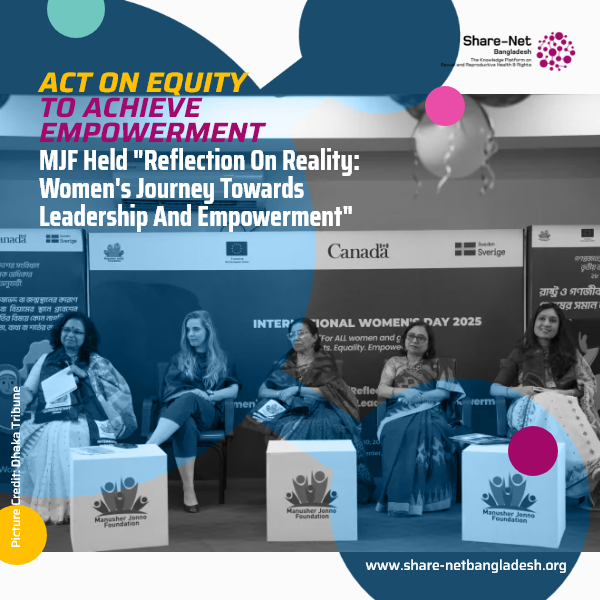Act On Equity To Achieve Empowerment: MJF Held “Reflection on Reality: Women’s Journey Towards Leadership and Empowerment”
Speakers at a recent event demanded immediate action to address the worsening crisis of gender-based violence in Bangladesh during a compelling event hosted by the Manusher Jonno Foundation (MJF) on March 10. Titled “Reflection on Reality: Women’s Journey Towards Leadership and Empowerment,” the meeting at MJF Tower coincided with International Women’s Day 2025, spotlighting systemic failures and societal attitudes fuelling violence against women.
Shaheen Anam, MJF’s Executive Director, opened with a stark reflection. “I’ve been wished ‘Happy Women’s Day,’ but there’s little to celebrate,” she said, pointing to a recent case in Dinajpur where a convicted child rapist, sentenced to life in 2016, was released. The victim’s family now lives in fear, a situation Anam called a “judicial failure.” She urged the state to protect victims and rallied women to resist despair and demand justice. The event also addressed a high-profile rape case in Magura that sparked social media outrage.
Banasree Mitra Neogi, MJF’s Director of Rights and Governance Programmes, criticised society’s inconsistent response. “Why no protests when a rapist from years ago walks free? Our tolerance is enabling this violence,” she said. Ms. Neogi described the pervasive fear women face—acid attacks, harassment, or lewd comments—as a form of violence itself, calling for a fearless society where women’s voices break through patriarchal silence.
Legal reform emerged as a critical issue. Speakers highlighted a new directive from the law adviser mandating rape case investigations within 15 days and trials within 90 days. “We’ll ensure it’s enforced,” Ms. Anam vowed, warning that such measures are hollow without action. The Dinajpur case, where bail overturned a life sentence, underscored the need to close legal gaps.
International partners lent their support. Maria Stridman of the Swedish Embassy praised Bangladesh’s rise to 99th in the 2024 Global Gender Gap Report—tops in South Asia—but noted persistent disparities in economic and leadership roles. “A gender-equal society is the goal,” she said. Stéphanie St-Laurent Brassard of Canada’s High Commission pledged a more profound commitment to women’s empowerment.
Keya Khan, the Director General of the Department of Women’s Affairs, detailed efforts like adolescent clubs in 4,553 unions and 330 municipalities to raise awareness. Yet, she admitted a flaw: “We’ve focused on women but neglected men, turning potential allies into adversaries. We need research to fix this.”
The event closed with a unified call for change. Beyond policy, speakers stressed that a cultural shift—legal accountability, societal courage, and male inclusion—are essential to ending gender-based violence. With cases like Dinajpur and Magura exposing deep flaws, the message is clear: Bangladesh must act now.
Source: The Daily Star
Picture Credit: Dhaka Tribune

